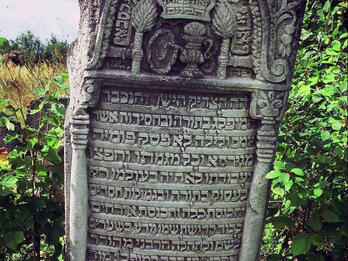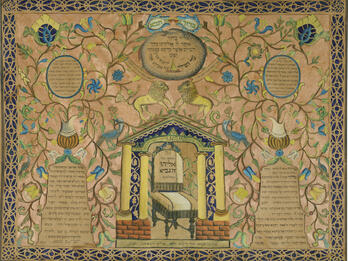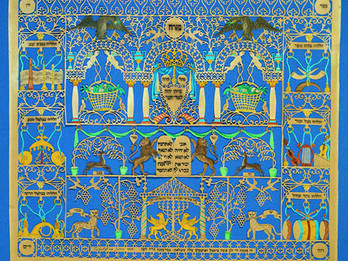Showing Results 1 - 8 of 8
Public Access
Image
This tombstone of a Torah scholar from Sieniawa, Poland includes motifs and symbols often found on Jewish tombstones in Poland, such as a crown and palm trees. Other common symbols on Jewish…
Contributor:
Artist Unknown
Places:
Sieniawa, Austrian Empire (Sieniawa, Poland)
Date:
1855
Subjects:
Categories:
Restricted
Image
Paper cuts have been a tradition of Jewish folk art, with the earliest record of one dating to the fourteenth century. Given the widespread availability of paper in Europe by the mid-nineteenth…
Contributor:
Nachman ha-Kohen Bialsker
Places:
Bielsk, Russian Empire (Bielsk Podlaski, Poland)
Date:
1862
Subjects:
Categories:
Restricted
Image
Paper cuts have been a tradition of Jewish folk art, with the earliest record of one dating to the fourteenth century. Given the widespread availability of paper in Europe by the mid-nineteenth…
Contributor:
Moses Michael Rosenboim
Places:
Schönlanke, Kingdom of Prussia (Trzcianka, Poland)
Date:
1848
Subjects:
Categories:
Restricted
Text
It is a work that contains two hundred precious and wondrous stories, full of ethical [edification] and [inspiring] fear of the Lord, sweeter than honey, bringing joy to oppressed hearts and souls…
Contributor:
Yitsḥak Dov Ber ben Tsvi Hirsh
Places:
Russian Empire (Poland, Poland)
Date:
1900
Restricted
Text
Once upon a time the tsadik Rebbe Levi Yitsḥak of Berditshev was in the city of Polonnoye, and an acquaintance approached him. He [the acquaintance] was an extremely poor man, with three sons and two…
Contributor:
Aaron Zeilingold
Places:
Warsaw, Russian Empire (Warsaw, Poland)
Date:
1911
Categories:
Public Access
Text
Once this was the heart of Warsaw—this labyrinth of sad narrow streets between tall tenement houses. Now this is a remote place, an ancient tumor on the body of the modern city, where its blood flows…
Contributor:
Alter-Sholem Kacyzne
Places:
Warsaw, Second Polish Republic (Warsaw, Poland)
Date:
1929
Restricted
Text
Now in that same shtetl there lived a youth named Shimen, but he was nicknamed Simkhe (joy, celebration) and Plakhte (coarse cloth) because he was barefoot and almost naked and that was all he wore…
Contributor:
Yankev Morgenshtern
Places:
Lodz, Russian Empire (Lodz, Poland)
Date:
1870s or 1880s
Subjects:
Public Access
Text
Sensitive Content
The sultan thought for a moment and said, “I know, Jew, that your heart is not devoid of intelligence. After all, you want to live a long life in your household with your children. So, do not…
Contributor:
Avraham S. Friedberg
Places:
Warsaw, Russian Empire (Warsaw, Poland)
Date:
1893





